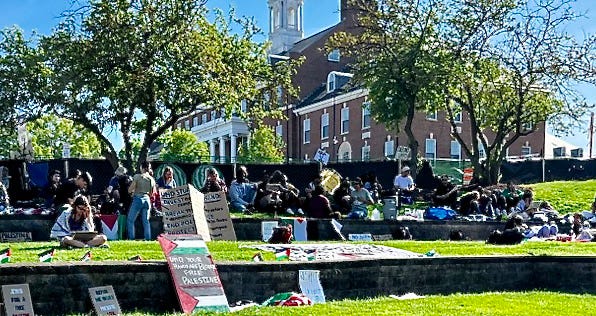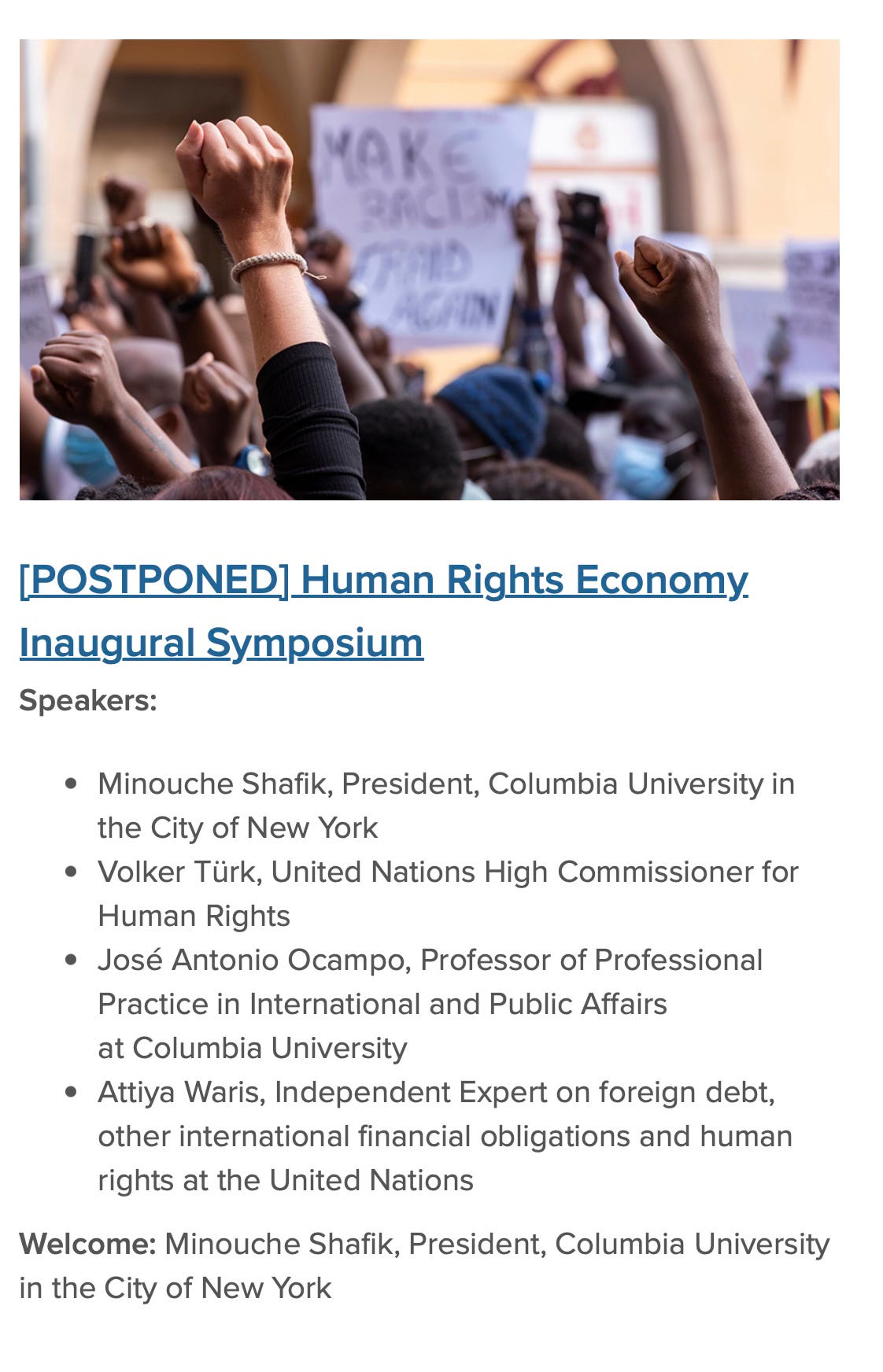Students on the Front Line
The Gaza protests are moral, brave, and part of a much broader struggle.
It’s beginning to look like the rallying cry of 1960’s-era student radicals – “Bring the War Home!” – is becoming a reality on many American campuses.
I visited the University of Maryland on Tuesday, as students protested the genocide in Gaza and their university’s role in it. The big news story that day was the police crackdown at Columbia University. Today, protests and crackdowns are occurring across the country. Predictably, the news coverage has been heavily skewed toward alleged antisemitism, downplaying the students’ moral stand and the horror they’re protesting.
That’s no accident. These students are on the front line in a conflict between global forces, a conflict that most of us have yet to fully grasp. Israel’s assault on Palestine is the tip of the spear for the Global North’s attack on those nations and peoples it sees as a threat. That has always included people inside the Global North who oppose its militarism.
The parallels can be striking. A phalanx of armed police in Texas looks like an occupying army. The barriers and checkpoints surrounding Columbia echo the ones enclosing Palestine. And in a faint but haunting echo of the horror in Gaza, the University of Minnesota has reportedly cut off the water supply to buildings used by demonstrators.
The University of Maryland was quiet by comparison. “We’re quite not at the Columbia level,” one protester told me apologetically. But what matters is presence, not mass; witness, not volume. Witness is immaterial, without weight or momentum. But, like a catalyzing atom in chemistry, a single act of witness can change everything. It can be the fraction that transforms the whole.
Two days later, we are already seeing signs of a larger transformation.
That’s exactly what the people who run this system fear the most. They understand the threat that popular movements pose to them, often before the rest of us do. That’s why they go to extreme lengths to suppress them. It’s also why they attempt to smear an entire movement with false accusations, in this case of antisemitism. Consider, for example, the observations of NBC News correspondent (and Emmy Award winner) Antonia Hylton as she covered the Columbia encampment:
“I want to clear some stuff up. I didn’t see a single instance of violence or aggression on the lawn or at the student encampment. The student-led protest was peaceful and often very quiet …
“The only moments of conflict or aggression I witnessed took place beyond the gates, out on Broadway Ave. I repeatedly approached people in that crowd. Every single person I approached told me they were NOT a Columbia or Barnard student ... Don’t imply students at Columbia/Barnard are involved in events that they were not present or responsible for.”
An open society doesn’t smear, discredit, and outlaw an entire group over the actions of a few – or for the actions of what might be agents provocateur. That’s not what democracies do. It is, however, a common totalitarian tactic. Nazis in Germany and antisemites in the US used the same tactic to smear Jews as an unpatriotic, subversive “fifth column” working to undermine their country. White supremacists used it in the 1960s when they said that civil rights workers were Soviet-led Communists and “outside agitators.” Racists use it today to imply that all Black people are criminals.
Decent people aren’t supposed to behave this way.
Somebody should tell Joe Biden. “I condemn the antisemitic protests,” the president said. But which “antisemitic protests” are those, Mr. President? Where is the evidence for “antisemitic protests”? The president’s phrasing slanders the brave young souls who are calling for justice and an end to the slaughter. It also aligns him with far-right Rep. Elise Stefanik (R-NY), who claims to be fighting “antisemitism” on campus but has echoed the antisemitic “great replacement theory” in her campaign literature.
Yes, there have been documented incidents of antisemitism, which must always be condemned. But, despite many accusations, extremely few of these incidents have been linked to pro-Palestinian students. This looks like the old totalitarian tactic, not the defense of a beleaguered minority. Otherwise, why wouldn’t they also condemn Islamophobia on campus?
I asked a Maryland student about Islamophobia. She laughed. “If we tried to document every act of prejudice against us,” she said, “we wouldn’t have time to do anything else.”
Biden qualified his statement, but in a slippery way. “I also condemn those who don’t understand what’s going on with the Palestinians,” he said. But who does he mean? Where? When? He doesn’t say. Why can’t he simply condemn anti-Muslim hate and those who wish death for Palestinians?
As for “those who don’t understand what’s going on with the Palestinians”: what is going on with them, Mr. President? Just say it: after 75 years of occupation and oppression, they’re being slaughtered at a rate unprecedented in modern history.
University presidents are willing participants in the violation of their own country’s democratic norms, as well as the norms of their own institutions. There is a kind of poetic symmetry in this announcement of a cancelled event, which was meant to celebrate the inauguration of Minouche Shafik as president of Columbia:
Human rights have indeed been “postponed” on American campuses. Why? Politicians and school administrators assert that phrases like “intifada” and “from the river to the sea” are antisemitic because they might be interpreted as a call for genocide against Israelis. But when a Jewish student website features a photo of grinning students wearing “I Stand With Israel” t-shirts – supporting a nation that a court found to be “plausibly” engaging in actual genocide against Muslim Arabs – that’s perfectly acceptable.
As I write, UMD students are joining students from other area schools in support of the encampment at George Washington University, a couple of blocks from the State Department and across the street from the real seat of diplomatic power: the headquarters of the International Monetary Fund.
They’re gathering now: from Georgetown, Howard, Gallaudet, George Mason, and American. They’re gathering, and they’re putting themselves on the line. Less than one hour ago, at 2:16 pm Eastern time, GWU president Ellen Granberg and Provost Chris Bracey issued a statement calling the protest “an unauthorized use of university space” and announcing that they had “request(ed) MPD assistance.”
That’s a polite way of saying they had asked the police to forcibly remove and perhaps arrest the demonstrators.
We should be proud of these young people. Despite the 1960s slogan, they’re not the ones “bringing the war back home.” The politicians and university presidents are doing that. These students are bringing our consciences back home. They are our brothers and sisters, our children and our grandchildren. They are brave, they are the best of us, and we owe them our love and gratitude.



Thank you for this tribute to these students. It takes me back to the 1960s when I was one of the ones protesting, on campus and in the streets of Los Angeles and San Francisco. A whole generation is being radicalized because those in power simply do not understand that the narrative has been taken from them and turned into a new one rooted in justice for all, not privilege for some.
One love!
This is consistent with my experience. Thank you!